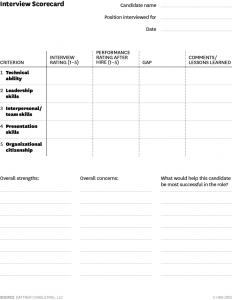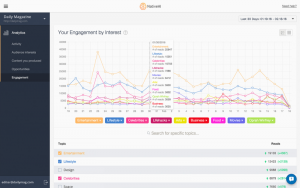— March 7, 2018
What to Think About Before Switching Staplers

Seems like everyone’s thinking about working at a startup. (Ok maybe not everyone, but a lot.)
Why?
We want our work to have an impact. There’s nothing like being part of a team that builds a company from the ground up.
It’s exciting. But it’s also challenging. And risky.
Three years ago, I was, sitting in my gray cubicle at supermegacorp under fluorescent lights in a faceless office park. I was desperate for a challenge, for some surprise.
So I lept.
After quitting that tax consulting job I landed in the middle of a small New York City startup called Hive that makes brain-pleasing project management software.
There were only a few employees with a lot to do. My old company employed 180,000. It was a drastic change, and that’s exactly what I wanted.
But it’s not right for everyone.
Here are the main differences between a tech startup and a big corporate company …
#1 Way More Responsibility
At a small startup, the future of the company lives or dies by the effort of early employees. That’s you, and that’s exhilarating and terrifying.
From Day 1 at Hive I was making big decisions. Analyses I did would affect which companies we partnered with, what we said on our website, how we priced our product, how much we spent on advertising—all kinds of stuff.
Not everything is a smashing success. Things go wrong. The blame rests wholly on my shoulders, but the successes do too.
When you work for a company with thousands of employees, you just don’t feel the frisson of making an impact. Could the ultimate success or failure of the company possibly hinge on what you do?
Nahhh.
Plus, all your work is reviewed by, like, three levels above you before it’s shared with clients.
Sure you do make a contribution. But it’s hard to feel like more than a cog in the machine. While it’s certainly less stressful, it can be disheartening.
Bottom Line: Before you go to a startup, decide whether you’re ready for more responsibility. We think we want more control. But with control comes consequences.
#2 Constant Change
Move fast and break things.
It’s the mantra of tech culture. This insistence on forward motion is what leads startups to “disrupt” so many industries.
In practice, it means you’re constantly adapting, and constantly not getting attached to the way things are.
New features get decided, developed, and released in two weeks. Sometimes two days. Marketing strategies are tried and abandoned after a month.
Change can be chaotic. In a few months, we grew Hive from five people to 20. You have to be able to keep up. You make decisions without any guidance or roadmap. Or net.
At first, I got frustrated by how often my work was thrown out because of product changes or new strategies. Then I learned how to anticipate better and I got comfortable making decisions with little guidance.
That’s not corporate. Change is so much slooower there in the cubicle. There are just too many people to coordinate and too much at stake.
Rather than the large ocean liner, powerful and impenetrable but unable to quickly change course, a startup is a sailboat, quick and agile—and much more exposed to getting swamped by wild seas.
No doubt, corporate is the right thing for some people. Also, many big companies have incubators and awesome innovation initiatives. But they still face real barriers, like innovator’s dilemma, to adopting new ideas and strategies.
But sure corporate work is more dependable and happens in more structured and predictable ways. There you find entrenched standards. Unpredictable client demands are handled with the work of others who’ve been there before.
Bottom Line: If you need order and predictability in life, definitely stick to working at a large, established company.
#3 No Bureaucracy
Startups just don’t have enough bodies for bureaucracy. If you want to do something, there are little to no rules and regulations to stop you.
For me, it’s awesome. I love executing my plans when I want to execute my plans, and never hearing someone say, “This is just the way we do things;” or, “We need to go through risk management.”
Bureaucracy is essential for big corporations. They maintain uniformity, ensure quality, reduce risks.
But boy they can be such a royal pain in the ass.
I hated filling out pointless forms and checking off boxes that had nothing to do with helping my clients solve problems.
To be sure, annoying as they are, these rules and regulation take care of lots of important administrative tasks so you don’t have to. Things like healthcare, 401(k)s, and parental leave are taken care of at big companies. Startups? Yeah, making it up as we go.
I do miss having money added automatically to my 401(k). Now I have to actively decide to add money there (which I don’t).
Bottom Line: At a startup, nothing slows you down, but neither is there a roadmap.
#4 Less Shitty Technology
Startups love technology. (Shocking revelation.)
We don’t settle for inefficient or buggy software or services, and there really is no barrier to switching to something new.
I’m lucky that I get to use one of the most advanced project management tools out there because it’s our product. It’s so easy to manage my day-to-day inside Hive. It’s sooo nice that I never feel slowed down by unreliable tech and software.
Corporate environments? Less so.
My old company used a lot of clunky, unhelpful software. I was used to the easy, fast user experience in my personal digital life. I hated how much time I wasted on bad software.
Good software is definitely a nice perk of startup life.
Bottom Line: Working at a startup requires taking on more ownership, adapting quickly, and making decisions without rules or guidelines.
Lastly …
If you’re in it for the casual work attire and flexibility …
If you need things like parental leave and 401(k) match …
If you like knowing your place and having a bit of certainty …
Yeah, I’d give corporate life another chance. But if you’re ready to have a real impact on your work and take on new and exciting challenges, it may be time for startup life.
Business & Finance Articles on Business 2 Community
(62)







